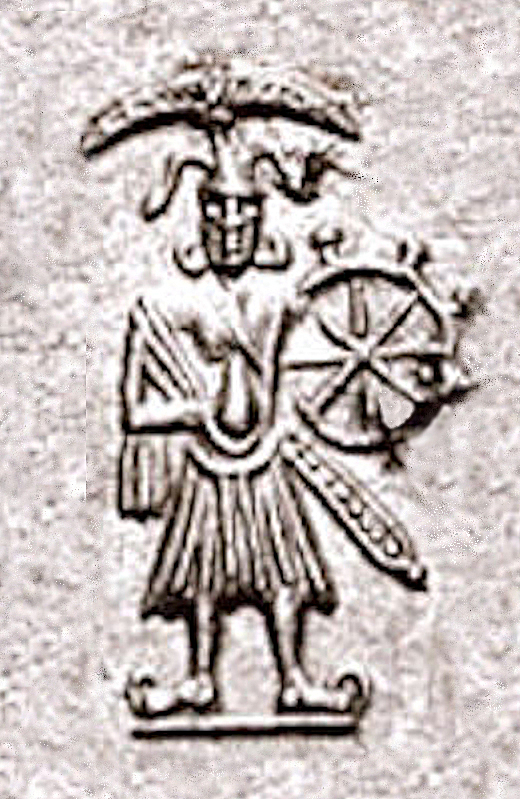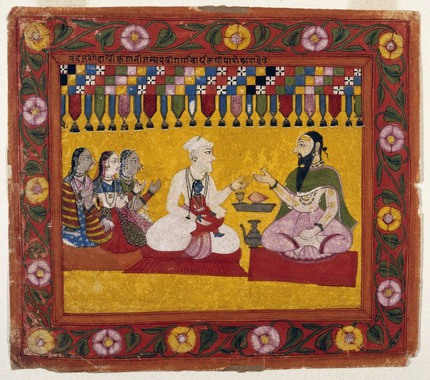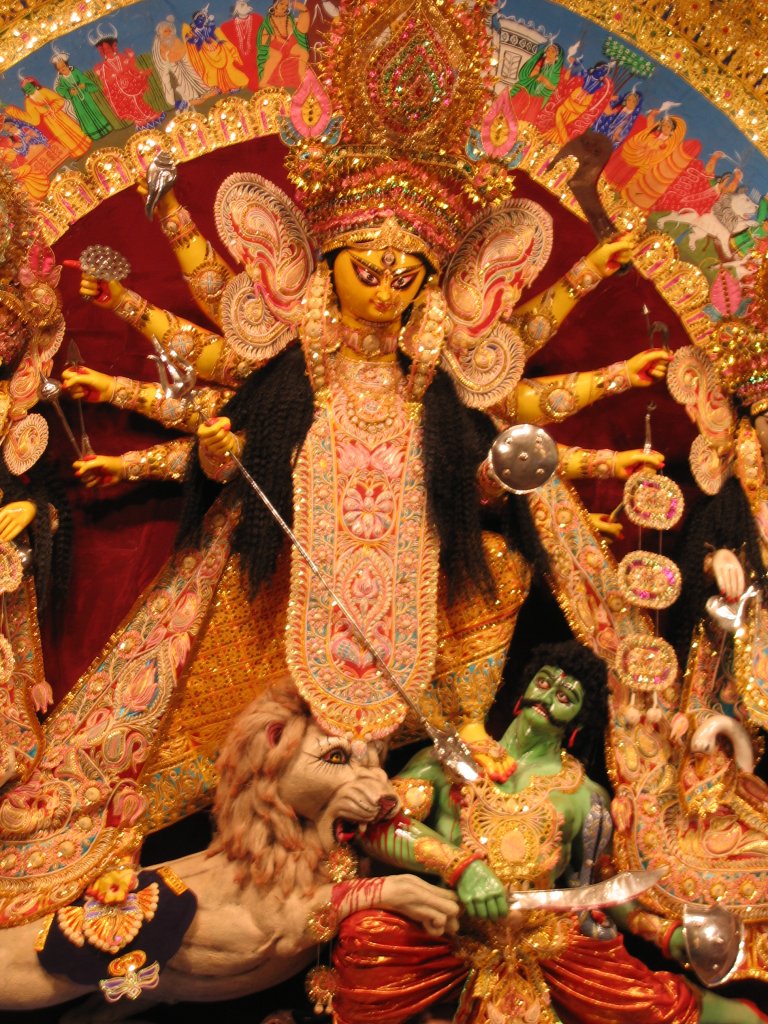|
Yogamaya
Yogamaya (, ) is a Hinduism, Hindu goddess who serves as the personification of Vishnu's powers of illusion. In Vaishnavism, Vaishnava tradition, she is accorded the epithet Narayani—"the sister of Narayana (Vishnu)"—and is regarded as the benevolent aspect of the goddess Durga. According to Hindu texts, Yogamaya plays the role of the facilitator of the earthly birth of Krishna, an incarnation of Vishnu. She took the avatar of the daughter of Yadava cowherd Nanda (Hinduism), Nanda and Yashoda, after which her place is swapped with Krishna to protect the latter from the tyrant ruler Kamsa. After warning Kamsa about his impending death, Yogamaya vanished and resided in the Vindhya Range, Vindhya hills, due to which she is accorded the epithet Vindhyavasini. Yogamaya is also an important goddess in Shaktism sect, and is worshipped as a form of Mahadevi. Etymology Yogamaya refers to “the internal potency of Vishnu, Bhagavan, that arranges and enhances all his pastimes� ... [...More Info...] [...Related Items...] OR: [Wikipedia] [Google] [Baidu] |
Kamsa
Kamsa (, ) was the tyrant ruler of the Vrishni kingdom, with its capital at Mathura, Uttar Pradesh, Mathura. He is variously described in Hindu texts, Hindu literature as either a human or an asura; The Puranas describe him as an asura, while the Harivamsa, Harivamśa describes him as an asura reborn in the body of a man. His royal house was called Bhoja; thus, another of his names was Bhojapati. He was the cousin of Devaki, the mother of the deity Krishna; Krishna ultimately fulfilled a prophecy by slaying Kamsa. Kamsa was born to King Ugrasena and Queen Padmavati. However, out of ambition, and upon the advice of his personal confidantes, Banasura and Narakasura, Kamsa decided to overthrow his father, and install himself as the King of Mathura. Therefore, upon the guidance of another advisor, Chanura, Kamsa decided to marry Asti and Prapti, the daughters of Jarasandha, King of Magadha (Mahajanapada), Magadha. After a heavenly voice prophesied that Devaki's eighth son would ... [...More Info...] [...Related Items...] OR: [Wikipedia] [Google] [Baidu] |
Ekanamsha
Ekanamsha (; ) is a Hindu goddess. She is primarily identified with the illusory power of Vishnu as Yogamaya. The goddess is believed to have been worshipped by the Vrishnis. Many "kinship triads", depicting Vasudeva Krishna, Balarama, and their sister Ekanamsha have been found in the Mathura region, which are stylistically dated to the early centuries of the Common era. She is believed to have also reincarnated as the goddess Subhadra, the daughter of Vasudeva and Rohini. Etymology In Sanskrit, Ekanamsha means "the single, portionless one", and is a name of the new moon. Another interpretation of her name is that the goddess Yogamaya came to be known as Ekanaṃsha because she was born of one part (''aṃśa'') of Vishnu himself. Literature Harivamsa According to S. C. Mukherji, a modern scholar, in the Harivamsa, Ekanamsha is identified as a ''shakti'' of Vishnu as the goddess of Ekadasi, having descended as the daughter of Nanda to protect the baby Krishna f ... [...More Info...] [...Related Items...] OR: [Wikipedia] [Google] [Baidu] |
Devaki
Devaki (Sanskrit: देवकी, International Alphabet of Sanskrit Transliteration, IAST: ''Devakī'') is a character in Hindu texts, Hindu literature, most noted for being the mother of the god Krishna. She is one of the seven daughters of Devapa or Devaka, a king of the Yadu, Yadu dynasty, and has four brothers. She is one of the wives of Vasudeva. Her cousin is Kamsa, the king of Mathura, a cruel tyrant who had been told by Narada that he had been an asura killed by Vishnu in his previous life (Kalanemi), exacerbating his wickedness. According to popular tradition, Devaki is considered to be an incarnation of Aditi, a mother goddess who was the daughter of Daksha and the wife of Kashyapa. Marriage During the nuptials of Vasudeva and Devaki following the former's wedding with his bride's six older sisters, Vishnu picked a lock of hair from his mount Shesha as well as his own, proclaiming that they would take be born as Devaki's seventh and eighth children, respectively. ... [...More Info...] [...Related Items...] OR: [Wikipedia] [Google] [Baidu] |
Birth Of Krishna
According to Hindu texts, Hindu scriptures such as the ''Mahabharata'', ''Harivamsa'', and the ''Krishna Charitas,'' the birth of Krishna took place in Mathura, in present-day Uttar Pradesh, on the Ashtami, eighth day of the ''Krishna Paksha'' of the Bhadra (Hindu calendar), Bhadrapada month of the Hindu calendar, to Vasudeva, Vasudeva Anakdundubhi, and his wife Devaki. According to Hindu mythology, Krishna was the eighth of the ten avatars of Vishnu, born in the ''Dvapara Yuga,'' the third age of the present Hindu cosmology. Krishna is revered as the Para Brahman, Supreme Being in many Hindu traditions, most notably in the Krishnaism tradition of Vaishnavism. Though Krishna's date of birth is heavily disputed, many scholars believe that Krishna was probably born around 3rd millennium BCE, or even earlier. Born in Mathura, in the prison of his maternal uncle Kamsa, Krishna was taken to Nanda (Hinduism), Nanda, by his father in Vraja, through river Yamuna, on the night of his birt ... [...More Info...] [...Related Items...] OR: [Wikipedia] [Google] [Baidu] |
Nanda (Hinduism)
Nanda or Nandagopa (, ) is a cow-herd chief, and the foster-father of Krishna, featured in the Harivamsha and the Puranas. Nanda is the son of Parjanya, a ruler of the Vraja region, who is a son of Devamidha. He is the chief of Gokulam, which was one of the mandals of the yadava tribe. He is sometimes referred to as a king but was a cow-herder in real. Nanda was a brother of Vasudeva. Vasudeva takes his newborn son, Krishna, to Nanda on the night of the child's birth, so that Nanda could raise him and to protect new born Krishna from his maternal uncle Kamsa. The chief, who is married to Yashoda, brings up both Krishna, and his brother, Balarama. Krishna derives his epithet ''Nandanandana'' (son of Nanda) from him. Legend Nanda was the foster-father of Krishna. He also helped to raise Balarama. Nanda, identified as King Nanda in many scriptures was a kinsman and a great friend of Vasudeva. The fact that King Nanda and King Vasudeva were brothers is confirmed both by the Bhaga ... [...More Info...] [...Related Items...] OR: [Wikipedia] [Google] [Baidu] |
Yashoda
Yashoda (, ) is the foster-mother of Krishna and the wife of Nanda. She is described in the Puranic texts of Hinduism as the wife of Nanda, the chieftain of Gokul, and the sister of Rohini. According to the Bhagavata Purana, Krishna was born to Devaki, but Krishna's father, Vasudeva, brought the newborn Krishna to his cousin Nanda, and his wife, Yashoda, in Gokulam. This was for his upbringing, as well as to protect Krishna from Devaki's brother, Kamsa, the tyrannical king of Mathura. Etymology The name Yashoda means 'one who is giver (da, ) of fame or glory (Yash, )'. Legends Origin According to the ''Bhagavata Purana'', Yashoda was the incarnation of Dhara, the wife of the Vasu, Drona. Little is known about Yashoda's early life, other than her marriage to Nanda. Kamsa, the ruler of Mathura, had decided to kill Krishna as soon as he was born. In order to protect Krishna from Kamsa, Krishna and Yogamaya were born at the same time from the wombs of Devaki and Y ... [...More Info...] [...Related Items...] OR: [Wikipedia] [Google] [Baidu] |
Bhadrakali
Bhadrakali (IAST: Bhadrakālī; ) is an important goddess, mainly worshiped by Hindus, and is a form of Kali. She is considered to be the auspicious and fortunate form of Adi Shakti or Durga, the supreme mother who protects the good, known as ''Bhadra or Bhadra Bhagavathy''. She is worshipped predominently in the South indian state of Kerala and Nashik. In Vaishnavism, Bhadrakali is among the many epithets of Yogamaya, the internal potency of illusion of the supreme preserver deity, Vishnu. In Shaivism, she accompanies Virabhadra, a form of Shiva, as manifestations of Shiva's wrath. Etymology The name Bhadra comes from Sanskrit. In Sanskrit, "bhadra" means "auspicious" or "fortunate". Another interpretation traces the name to the Sanskrit root word (Beeja akshara) "bha" and "dra". The letter "bha" signifies "delusion" or "maya", while "dra" is used as a superlative meaning "the most" or "the greatest". Together, "bhadra" may mean "maha maya" or "great delusion". Forms Acc ... [...More Info...] [...Related Items...] OR: [Wikipedia] [Google] [Baidu] |
Narayani Dham Idol
Narayani may refer to: * Narayani, an epithet of the goddess Lakshmi or Vishnu's divine energy, Yogamaya * * Narayani River, or Gandaki River, in Nepal * Narayani Temple, in Narayani village, near Khalikote, Odisha, India * Narayani Zone, a former administrative region of Nepal * Narayani Shastri Narayani Shastri is an Indian television and theatre actress known for her roles in ''Kyunki Saas Bhi Kabhi Bahu Thi'' as Kesar Anupam Kapadia, ''Piya Ka Ghar'' as Rimjhim Avinash Sharma, ''Namak Haraam'' as Swati Karan Sehgal, Rishton Ka Cha ... (fl. from 2000), Indian actress See also * * Narayan (other) * Narayani Sena, army of Krishna in the ''Mahabharata'' {{disambig, geo, given name ... [...More Info...] [...Related Items...] OR: [Wikipedia] [Google] [Baidu] |
Shaktism
Shaktism () is a major Hindu denomination in which the God in Hinduism, deity or metaphysics, metaphysical reality is considered metaphorically to be a woman. Shaktism involves a galaxy of goddesses, all regarded as different aspects, manifestations, or personifications of the divine feminine energy called ''Shakti''. It includes various modes of worship, ranging from those focused on the most worshipped Durga, to gracious Parvati, and the fierce Kali. After the decline of Buddhism in India, various Hindu and Buddhist goddesses were combined to form the Mahavidya, a Pantheon (religion), pantheon of ten goddesses. The most common forms of the Mahadevi worshipped in Shaktism include: Durga, Kali, Saraswati, Lakshmi, Parvati, and Tripura Sundari. Also worshipped are the various Gramadevatas across the Indian villages. Shaktism also encompasses various Tantra#Śaiva and Śākta tantra, tantric sub-traditions, including Vidyapitha and Kulamārga. Shaktism emphasizes that intense ... [...More Info...] [...Related Items...] OR: [Wikipedia] [Google] [Baidu] |
Vishnu
Vishnu (; , , ), also known as Narayana and Hari, is one of the Hindu deities, principal deities of Hinduism. He is the supreme being within Vaishnavism, one of the major traditions within contemporary Hinduism, and the god of preservation (sattva). Vishnu is known as ''The Preserver'' within the Trimurti, the triple deity of Para Brahman, supreme divinity that includes Brahma and Shiva.Gavin Flood, An Introduction to Hinduism' () (1996), p. 17. In Vaishnavism, Vishnu is the supreme Lord who creates, protects, and transforms the Hindu cosmology, universe. Tridevi is stated to be the energy and creative power (Shakti) of each, with Lakshmi being the equal complementary partner of Vishnu. He is one of the five equivalent deities in Panchayatana puja of the Smarta tradition of Hinduism. According to Vaishnavism, the supreme being is with qualities (Saguna Brahman, Saguna), and has definite form, but is limitless, transcendent and unchanging absolute Brahman, and the primal Atma ... [...More Info...] [...Related Items...] OR: [Wikipedia] [Google] [Baidu] |
Krishna
Krishna (; Sanskrit language, Sanskrit: कृष्ण, ) is a major deity in Hinduism. He is worshipped as the eighth avatar of Vishnu and also as the Supreme God (Hinduism), Supreme God in his own right. He is the god of protection, compassion, tenderness, and love; and is widely revered among Hindu divinities. Krishna's birthday is celebrated every year by Hindus on Krishna Janmashtami according to the lunisolar calendar, lunisolar Hindu calendar, which falls in late August or early September of the Gregorian calendar. The anecdotes and narratives of Krishna's life are generally titled as ''Krishna Līlā''. He is a central figure in the ''Mahabharata'', the ''Bhagavata Purana'', the ''Brahma Vaivarta Purana,'' and the ''Bhagavad Gita'', and is mentioned in many Hindu philosophy, Hindu philosophical, Hindu theology, theological, and Hindu mythology, mythological texts. They portray him in various perspectives: as a god-child, a prankster, a model lover, a divine hero, ... [...More Info...] [...Related Items...] OR: [Wikipedia] [Google] [Baidu] |
Durga
Durga (, ) is a major Hindu goddess, worshipped as a principal aspect of the mother goddess Mahadevi. She is associated with protection, strength, motherhood, destruction, and wars. Durga's legend centres around combating evils and demonic forces that threaten peace, prosperity, and dharma, representing the power of good over evil. Durga is believed to unleash her divine wrath against the wicked for the liberation of the oppressed, and entails destruction to empower creation. Durga is seen as a motherly figure and often depicted as a beautiful woman, riding a lion or tiger, with many arms each carrying a weapon and often defeating demons. She is widely worshipped by the followers of the goddess-centric sect, Shaktism, and has importance in other denominations like Shaivism and Vaishnavism. The most important texts of Shaktism, Devi Mahatmya and Devi Bhagavata Purana, revere Devi (the Goddess) as the primordial creator of the universe and the Brahman (ultimate truth and reali ... [...More Info...] [...Related Items...] OR: [Wikipedia] [Google] [Baidu] |









